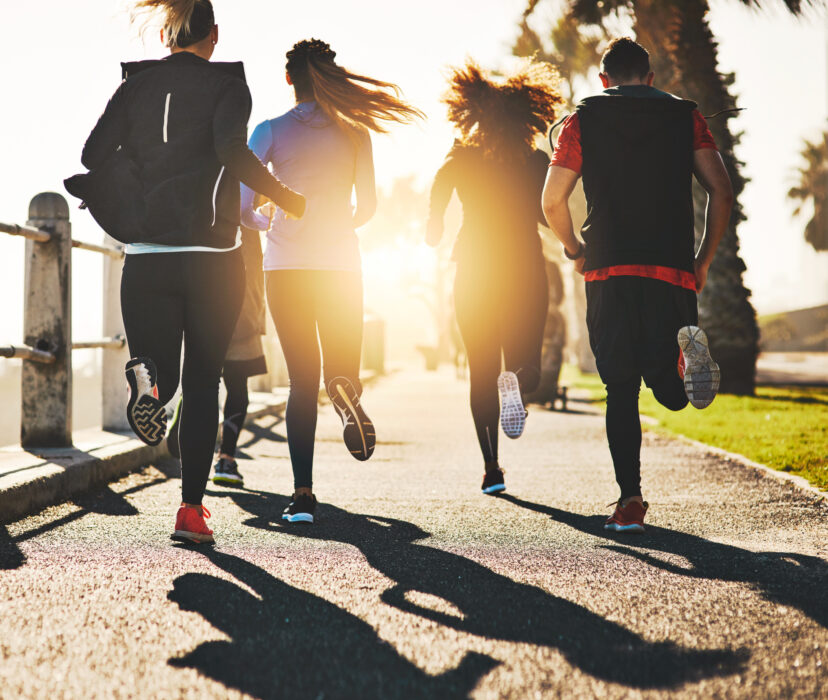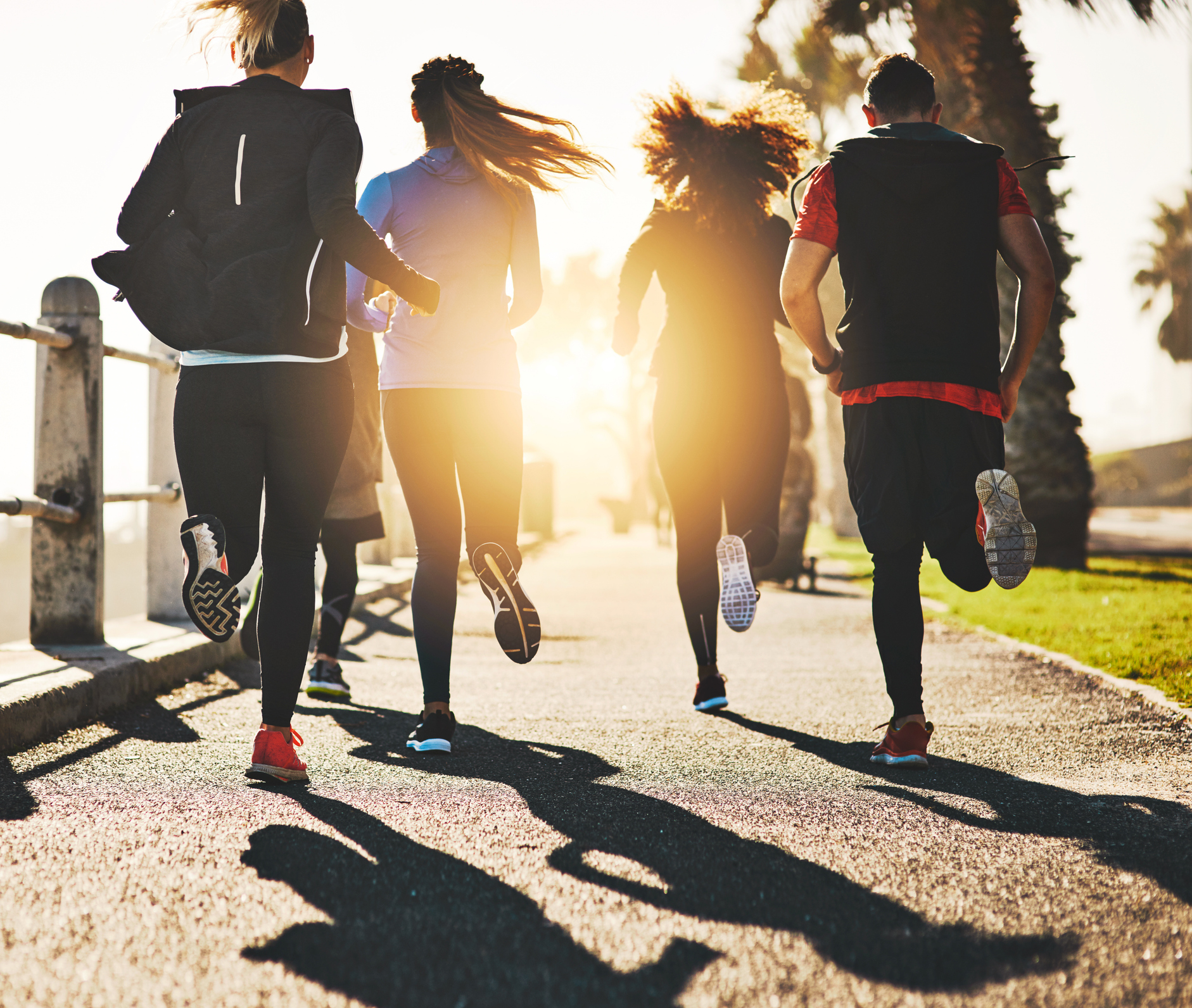
Start the new year with new energy
Start the new year with new energy

For many of us, Christmas, New Year, and the holiday season is a time to kick back, relax, and enjoy a few festive treats. But by the time the working week rolls around again in January, you may be feeling the guilt of having overindulged, or some dismay at the possibility of more stress and fatigue.
Before you dive into the latest fad diet or “detox” programme, take a moment to consider what your body really needs. Simple, sustainable changes are key to maintaining a healthy mind and body. Here are some practical tips to replenish your energy reserves, support your mood, and set yourself up for a balanced start to the year.
Reassess your diet
Excesses of sugar and alcohol can deplete nutritional status and contribute to weight gain, fatigue, and low mood.[1] Adults gain an average of 0.37 kg during the holiday season – more than half of the weight gained throughout the year.[2]
Weight loss is a common New Year’s resolution, but ‘fad diets’ rarely provide lasting results.
Instead, the most efficient way to support metabolic function and energy production is to eat a range of nutrient-dense wholefoods.[3] Maximising intake of fruits, vegetables, whole grains, and legumes while limiting the intake of added sugar, fat, and salt is critical for cardiovascular health, blood sugar control, and healthy elimination.[4] Fruits and vegetables that have undergone minimal processing provide a range of phytochemicals with important antioxidant benefits that support the brain, heart, immune system and more.[5]
- A healthy plate should include lean protein, carbohydrates, vegetables, and healthy fats for macronutrients, micronutrients, fibre, and slow-release energy.
- Focus on replenishment, not restriction. Support natural detox pathways with water, fibre, and antioxidant-rich foods.
- Reduce reliance on sugar or caffeine for quick fixes. Build energy reserves with consistent habits rather than quick highs.
Set healthy sleep patterns
Late nights, travel, alcohol intake, digestive issues, and the use of devices can disrupt the body’s natural circadian rhythm – the inherent 24-hour cycles in our brains that regulate patterns of alertness and sleepiness.
Studies have shown that poor circadian rhythm can reduce the amount of time spent in restorative rapid-eye movement (REM) sleep.[6] Around two hours of REM sleep each night is essential for supporting a range of physiological processes as well as memory consolidation, emotional processing, and healthy brain development.[7]
- Establish a consistent bedtime routine. A regular sleep-wake time – even on weekends – is essential for regulating your body clock.
- Create a sleep-conducive environment. Your bedroom should be quiet, dark, and cool. Avoid large meals, caffeine, and alcohol before bedtime, and minimize use of devices that emit blue light.
- Supplementing with magnesium has been shown to support relaxation, sleep duration, and sleep quality.[8]
Implement a regular fitness routine
Exercise boosts energy and builds stress resilience in several ways. It enhances energy production by increasing mitochondria – the ‘powerhouses’ of cells that generate ATP, the body’s main energy source.[9]
Regular exercise also supports the prefrontal cortex, the brain region responsible for attention, learning, memory, and other cognitive functions.[10],[11] In addition, physical activity can improve levels of brain norepinephrine and dopamine, which drive motivation and promote an overall sense of wellbeing.[12]
Research shows that people who exercise regularly are better equipped to handle stress, with stronger coping strategies and greater emotional resilience than those who don’t.[13]
- Just 10-30 minutes of exercise on most days can help to improve mood and quality of life.
- Choose activities you enjoy and fit into your schedule.
- Exercising has even greater benefits for improving vitamin D levels and regulating cortisol.[14]
Stimulate healthy energy production
Alongside a healthy diet and exercise, B vitamins can provide additional biochemical support for mental and physical resilience. The eight B vitamins (B1, B2, B3, B5, B6, B8, B9, and B12) assist in converting fats, carbohydrates, and proteins from food into energy, as well as producing the bioactive molecules our bodies rely on daily.[15]
B vitamins play a key role in brain health by acting as cofactors in the production and regulation of dopamine and serotonin – neurotransmitters that support a healthy mood and stress response. Vitamins B6 and B12 are especially vital for neurotransmitter synthesis and maintaining neurological function.[16]
A B-complex is often more effective than supplementing with individual vitamins, as they work together to support energy production, mood and stress resilience.[17]
Support recovery and resilience
Magnesium is one of the body’s hardest-working minerals, driving over 300 biochemical reactions. It’s essential for physical recovery and relaxation, helping to facilitate nerve impulses and muscle function.[18]
For anyone kicking off a new fitness regime – or getting back into one – magnesium can help ease muscle soreness during both training and recovery.[19]
Magnesium is particularly helpful for managing or preventing work-related stress as it contributes to the regulation of cortisol, the stress hormone.[20] It also inhibits the release of glutamate, an excitatory neurotransmitter that can heighten feelings of anxiousness or worry.[21]
With the right tools, your body and mind are fully capable of recovering from holiday excesses and taking on the new year. Make this your opportunity to cultivate sustainable energy habits and embrace a healthier, more vibrant version of yourself.
This content is for educational purposes only and is not a substitute for health professional advice.
[1] Witek, K., Wydra, K., & Filip, M. (2022). A High-Sugar Diet Consumption, Metabolism and Health Impacts with a Focus on the Development of Substance Use Disorder: A Narrative Review. Nutrients, 14(14), 2940. https://doi.org/10.3390/nu14142940
[2] Yanovski, J. A., Yanovski, S. Z., Sovik, K. N., Nguyen, T. T., O’Neil, P. M., & Sebring, N. G. (2000). A prospective study of holiday weight gain. The New England Journal of Medicine, 342(12), 861–867. https://doi.org/10.1056/NEJM200003233421206
[3] Esquivel M. K. (2022). Nutrition Benefits and Considerations for Whole Foods Plant-Based Eating Patterns. American Journal of Lifestyle Medicine, 16(3), 284–290. https://doi.org/10.1177/15598276221075992
[4] Ramezani, F., et al. (2022). Dietary fiber intake and all-cause and cause-specific mortality: An updated systematic review and meta-analysis of prospective cohort studies. Clinical Nutrition, 43(1), 65–83.
[5] Esquivel M. K. (2022). Nutrition Benefits and Considerations for Whole Foods Plant-Based Eating Patterns. American Journal of Lifestyle Medicine, 16(3), 284–290. https://doi.org/10.1177/15598276221075992
[6] Desai, D., Momin, A., Hirpara, P., Jha, H., Thaker, R., & Patel, J. (2024). Exploring the Role of Circadian Rhythms in Sleep and Recovery: A Review Article. Cureus, 16(6), e61568. https://doi.org/10.7759/cureus.61568
[7] Summer, J., & Singh, A. (2024, March 22). REM Sleep: What It Is and Why It Matters. Retrieved from Sleep Foundation website: https://www.sleepfoundation.org/stages-of-sleep/rem-sleep
[8] Zhang, Y., Chen, C., Lu, L., Knutson, K. L., Carnethon, M. R., Fly, A. D., Luo, J., Haas, D. M., Shikany, J. M., & Kahe, K. (2022). Association of magnesium intake with sleep duration and sleep quality: findings from the CARDIA study. Sleep, 45(4), zsab276. https://doi.org/10.1093/sleep/zsab276
[9] Memme, J. M., Erlich, A. T., Phukan, G., & Hood, D. A. (2021). Exercise and mitochondrial health. The Journal of Physiology, 599(3), 803–817. https://doi.org/10.1113/JP278853
[10] Basso, J. C., Shang, A., Elman, M., Karmouta, R., & Suzuki, W. A. (2015). Acute Exercise Improves Prefrontal Cortex but not Hippocampal Function in Healthy Adults. Journal of the International Neuropsychological Society: JINS, 21(10), 791–801. https://doi.org/10.1017/S135561771500106X
[11] Basso, J. C., & Suzuki, W. A. (2017). The Effects of Acute Exercise on Mood, Cognition, Neurophysiology, and Neurochemical Pathways: A Review. Brain Plasticity (Amsterdam, Netherlands), 2(2), 127–152. https://doi.org/10.3233/BPL-160040
[12] Stahl S. M. (2002). The psychopharmacology of energy and fatigue. The Journal of Clinical Psychiatry, 63(1), 7–8. https://doi.org/10.4088/jcp.v63n0102
[13] Childs, E., & de Wit, H. (2014). Regular exercise is associated with emotional resilience to acute stress in healthy adults. Frontiers in Physiology, 5, 161. https://doi.org/10.3389/fphys.2014.00161
[14] Noseworthy, M., Peddie, L., Buckler, E. J., Park, F., Pham, M., Pratt, S., Singh, A., Puterman, E., & Liu-Ambrose, T. (2023). The Effects of Outdoor versus Indoor Exercise on Psychological Health, Physical Health, and Physical Activity Behaviour: A Systematic Review of Longitudinal Trials. International Journal of Environmental Research and Public Health, 20(3), 1669. https://doi.org/10.3390/ijerph20031669
[15] Hanna, M., Jaqua, E., Nguyen, V., & Clay, J. (2022). B Vitamins: Functions and Uses in Medicine. The Permanente Journal, 26(2), 89–97. https://doi.org/10.7812/TPP/21.204
[16] Calderón-Ospina, C. A., & Nava-Mesa, M. O. (2020). B Vitamins in the nervous system: Current knowledge of the biochemical modes of action and synergies of thiamine, pyridoxine, and cobalamin. CNS Neuroscience & Therapeutics, 26(1), 5–13. https://doi.org/10.1111/cns.13207
[17] Young, L. M., Pipingas, A., White, D. J., Gauci, S., & Scholey, A. (2019). A Systematic Review and Meta-Analysis of B Vitamin Supplementation on Depressive Symptoms, Anxiety, and Stress: Effects on Healthy and ‘At-Risk’ Individuals. Nutrients, 11(9), 2232. https://doi.org/10.3390/nu11092232
[18] Al Alawi, A. M., Majoni, S. W., & Falhammar, H. (2018). Magnesium and Human Health: Perspectives and Research Directions. International Journal of Endocrinology, 2018, 9041694. https://doi.org/10.1155/2018/9041694
[19] Tarsitano, M. G., Quinzi, F., Folino, K., Greco, F., Oranges, F. P., Cerulli, C., & Emerenziani, G. P. (2024). Effects of magnesium supplementation on muscle soreness in different types of physical activities: a systematic review. Journal of Translational Medicine, 22(1), 629. https://doi.org/10.1186/s12967-024-05434-x
[20] Pochwat, B., Szewczyk, B., Sowa-Kucma, M., Siwek, A., Doboszewska, U., Piekoszewski, W., Gruca, P., Papp, M., Nowak, G. (2014). Antidepressant-like activity of magnesium in the chronic mild stress model in rats: alterations in the NMDA receptor subunits. International Journal of Neuropsychopharmacology, 17(3), 393–405. https://doi.org/10.1017/S1461145713001089
[21] Pickering, G., Mazur, A., Trousselard, M., Bienkowski, P., Yaltsewa, N., Amessou, M., Noah, L., & Pouteau, E. (2020). Magnesium Status and Stress: The Vicious Circle Concept Revisited. Nutrients, 12(12), 3672.




